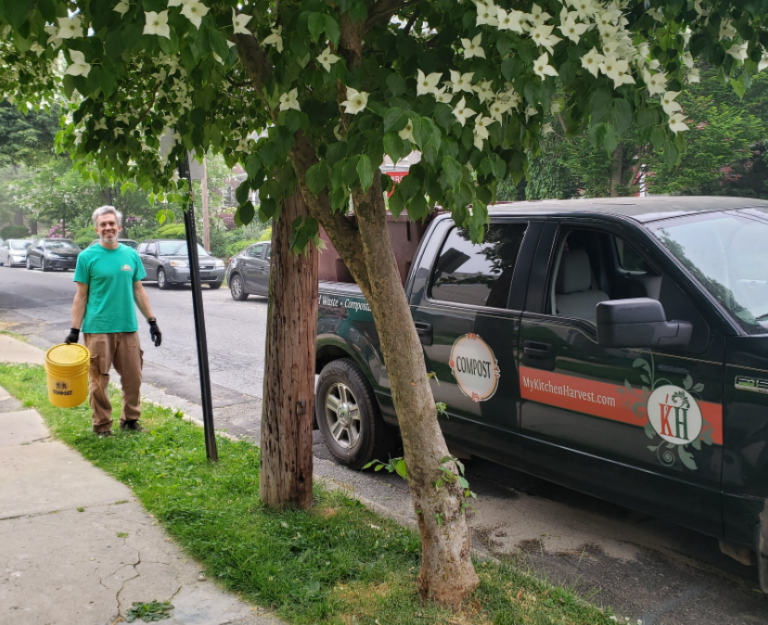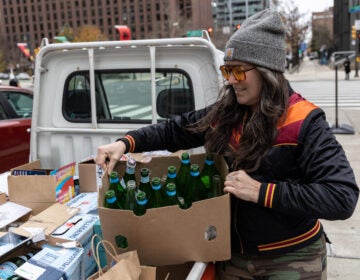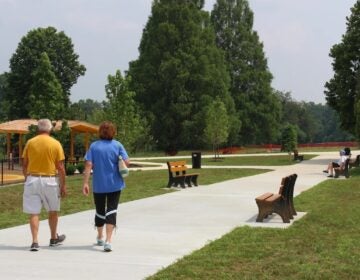‘Gotta get a bucket’: Media Borough debuts municipal-wide composting program
The borough hopes the program will reduce household waste up to 30%, create nutrient-rich soil, and lower the carbon footprint.

Chris Pieretti is the owner of Kitchen Harvest, a local composting company. (Courtesy: Karen Taussig-Lux)
If you have the sudden urge to “get a bucket,” you might have caught a glimpse of Media Borough’s quirky video promotion debuting a mysterious yellow bucket.
As of July, residents of Media have a new avenue of food waste removal at their disposal — municipality-wide composting. Every Wednesday, the borough’s public works department will come, collect yellow bucket food waste, and ensure that it is taken to Linvilla Orchards in Media to be composted.
Borough officials hope the program will reduce household waste up to 30%, create nutrient-rich soil, and lower the carbon footprint by keeping food scraps from being burned at the incinerator in Chester.
“This is just an important step … towards making a real impact on the environment that we can do collectively as a town,” said Amy Johnson, vice president of Media Borough Council.
Before July, the composting program only existed in its pilot form. But so far, the expansion of the yellow bucket has been well-received not just from residents, but from other municipalities as well.

“We have gotten a couple of calls about how we did this program, how we expanded the program, and it’s really great to see some of my colleagues, other managers in townships and boroughs, reaching out and trying to learn how they can replicate the service,” said Brittany Forman, the borough manager of Media.
Despite the appearance of overnight success, the excursion into composting was many years in the making. Upon an initial look into the possibility, local officials ran into a problem: They didn’t know where the composted waste would go.
Eventually, the borough learned of a local composting farm, Kitchen Harvest, which operates out of Linvilla Orchards and was already picking up the compost of several residents and even a nearby business. With a place for the waste to go, the borough could now look further into composting as a viable solution.
In 2017, Media formed a compost planning committee comprising local officials and community members. Eventually, the borough called on the Pennsylvania Department of Environmental Protection to sponsor an SCS Engineers study into small town composting.
“And we looked at small towns in the northeast who had launched food composting programs. None of them were as tiny as Media, but it was very helpful,” said Karen Taussig-Lux, the borough’s grants administrator.
The findings, which were released in 2018, helped the borough create a blueprint for an ideal composting program. However, they had to start small.
In 2019, Media Borough Council passed a budget that would allow for the creation of a 100-household pilot where Kitchen Harvests would pick up the buckets every single week for one year.
“We provided yellow buckets to each of the participants and we provided an orientation. We had our committee writing regular newsletters and updates to this select group of 100 households, and we really used this group to learn about how could this run smoothly,” Johnson said.
The pilot was a success. Residents were very receptive to the new program.
“We did surveys during the pilot, and we had remarkable results. First of all, we had like 80% returns on the surveys. And then we had … 100% satisfaction when people rated how happy they were with the program,” Taussig-Lux said.
With such positive feedback, the borough brought the composting pilot back for round two in 2020. This time the participant pool more than doubled to 220 households.
There was even a waiting list.
During budget season at the end of last year, Media Borough Council had seen enough. They finally greenlit a townwide expansion of the composting program. Now the borough’s own public works staff picks up composting waste alongside yard waste every Wednesday and takes it to Kitchen Harvest at Linvilla Orchards.
This undertaking was not, and is not, as easy as it seems. The issue of cost was a major obstacle. Initially, borough officials thought of charging residents a low rate for the composting services. However, they soon realized they could simply intermingle the new compost program with the existing yard waste services.
“We’re still working out the kinks in figuring out where all the buckets are going to be, but it seems to be working. And we’re really delighted to be able to somewhat seamlessly incorporate it into our waste management systems here at the borough,” Taussig-Lux said.
For those that have seen the project through from birth to completion, there is a great sense of pride.
“It’s just really exciting to have seen this process through to fruition,” said Sari Steuber, a leader of Transition Town Media and member of the borough’s composting committee. “We started about four years ago, planning the whole thing, and figuring out what was needed and how to go about it. And now that it is actually in process, it’s a very wonderful sense of accomplishment.”
Because the pilot was well-received, the composting committee did not have to do much work to promote it.
However, they still reached out to local filmmaker and early participant of the pilot program, Rich Hoffman, to put together the yellow bucket video.
“We’re really blessed in this town to have some very creative people, including a filmmaker who agreed to volunteer basically to make that video. And I think it was a great way to get the word out,” Steuber said.
The do’s and don’ts of composting in Media are quite simple. Just toss food scraps into the yellow bucket, but there are some important caveats: no dairy, no meat, no bones, no plastic, and no dog waste.
Media officials are trying to keep the process as streamlined as possible. In the future, the borough may allow dairy, meat, and bones — just not right now.
“Everybody that picks up their yellow bucket gets a really colorful and clear information sheet that they can hang up on their refrigerator, so they can be reminded of what goes in and what doesn’t go in,” Johnson said.
One surprising thing that can be composted is pizza boxes, which tend to be the bane of many recycling initiatives because of the grease.
Media characterizes its 70% recycling participation rate as “high.” Currently, recycling and yard waste programs divert about 30% of solid residential waste away from the incinerator in Chester, which a 2019 New School study concluded was one of the largest polluters of its kind in the country.
The facility incinerates trash from Delco as well as Philadelphia, New Jersey, New York, and even Ocean City, Maryland. Chester residents have been increasingly vocal about their opposition to the facility. While some municipalities have been silent on the issue, Media borough officials say that it weighed heavily on their minds and even influenced their search for alternative disposal methods.
“That’s kind of been a goal all along: to reduce materials going to the incinerator, to increase recycling. It’s something we’ve worked on for the last 14 years anyhow, both for residents and … for businesses in Media,” Taussig-Lux said. “The Council passed this past spring, they passed a resolution urging Delaware County to look more at zero waste systems and to find an alternative to having the county waste go to … the incinerator.”
Steuber, of Transition Town Media, believes that the incinerator is an “egregious” example of environmental injustice.
“Relieving the burden on Chester is another important goal that we have in this whole trash reduction campaign,” Steuber said.
While the borough now pays a usage fee for the compost operation, it’s actually less than what they would pay the incinerator to burn trash, according to Johnson.
In the meantime, borough officials hope that the soil created by the compost gets used by local farmers and gardeners. They are even looking at ways to bring some of the soil back to households.

Get daily updates from WHYY News!
WHYY is your source for fact-based, in-depth journalism and information. As a nonprofit organization, we rely on financial support from readers like you. Please give today.







